Fish Lakes Hike in Banff via North Molar Pass
One of the best hikes in Banff takes you to Fish Lakes via North Molar Pass. Very fit hikers could knock off the 29.6 km return hike to the lakes in a very long day. My recommendation is to book a backcountry campsite and stay for a couple of nights at the Fish Lake Campground, so you can truly enjoy what is truly one of the best backpacking trips in Banff National Park.
The mountain scenery on the Fish Lakes hike in Banff is superb with a long stretch of the Fish Lakes trail above treeline. In summer, wildflowers are prolific in the sub-alpine meadows.
Upper Fish Lake enjoys a spectacular setting at the base of a massive wall of rock and yet it doesn’t get the traffic of some of the more famous hikes in Banff.
This post includes some affiliate links. If you make a qualifying purchase through one of these links, I will receive a small percentage of the sale at no extra cost to you. Thank you very much for your support.

Would you like to save this?
North Molar Pass – Fish Lakes hike in Banff details
Distance: 23 km (14.3 miles) round trip to North Molar Pass; 29.6 km (18.4 miles) round trip to Fish Lakes
Elevation gain: 762 m (2,500 feet) to North Molar Pass; 1,128 m (3,701 feet) to Fish Lakes
Trailhead location: Mosquito Creek
Trailhead elevation: 1,830 metres or 6,004 feet
Level of difficulty: Moderate as a backpacking trip: hard as a day hike
Time needed: 8 hours return to the pass; allow 2 days and an overnight for the Fish Lakes hike in Banff. Make backcountry reservations well in advance.
Map needed: Hector Lake 82N/9. I also recommend Organic Maps as an offline hiking app.
Dogs allowed: Yes, on a leash. Beware of porcupines at Fish Lake.
Options from Fish Lakes: Add on an overnight trip to Devon Lakes. You would need another night at the Fish Lakes campground on the return to do that.
Before you go: Check trail conditions.
Don’t forget: Practice the seven Leave No Trace principles, packing out everything you pack in. Be sure to carry the hiking essentials in your backpack.

A few things to take on the Fish Lakes hike in Banff
Water treatment tablets like these ones as they’re fast and lightweight.
A lightweight camping pillow so you get a good night’s sleep.
Compression sacks for your bulky items are hugely helpful. I always use them for my sleeping bag now.
Compeed for blisters – way better for fast healing than anything else I’ve used and worth every penny/
If you have a gear failure on the trail, these gear patches can save the day.
The one piece of warm clothing that always comes with me that will last you a decade is a lightweight down jacket like the Marmot Jena jacket. It’s ideal for cold nights in camp.
What makes Fish Lakes & North Molar Pass a standout hike in Banff?
There are a couple of things about the Fish Lakes hike in Banff that are particularly appealing. For starters the hike starts off gently after you knock off the one short hill at the start of the trail.
The gradient stays gradual all the way to the Mosquito Creek Campground, 5.5 km in from the trailhead. Over that distance it only climbs 186 metres. What a difference compared to hikes like King Creek Ridge in Kananaskis Country that have you huffing and puffing within minutes of starting to hike!
You have to cross a couple of narrow bridges over fast moving streams between the start of the trail and the Mosquito Creek campground.
As an aside the backcountry campground is one of the prettier ones I’ve seen in Banff National Park – filled with big boulders beside the river and very few mosquitoes compared to what we encountered at the Fish Lakes Campground.
If you were planning a late start to Fish Lakes, it would be a lovely spot to spend the night.

The climbing starts after the Mosquito Creek campground
From the Mosquito Creek campground to North Molar Pass you must climb 575 m (1,886 feet) over 6 kilometres – mostly at a moderate grade.
The trail leaves the campground via a bridge over the creek. It continues to follow the creek for about a kilometre with one more creek crossing along the way. Reach a signed trail junction, 1.8 km past the campground. Stay left for North Molar Pass. (If you go right you’d be heading for Molar Pass – another one of the worthwhile Banff day hikes.)
Continue through the woods until you reach beautiful sub-alpine meadows – dotted with wildflowers in July.
Rock hop across the stream before you reach Mosquito Lake (not named on the topo map). From the lake the trail to Fish Lakes steepens as it begins to curve southeast. Hike through rock – and perhaps snow to reach the austere looking North Molar Pass.
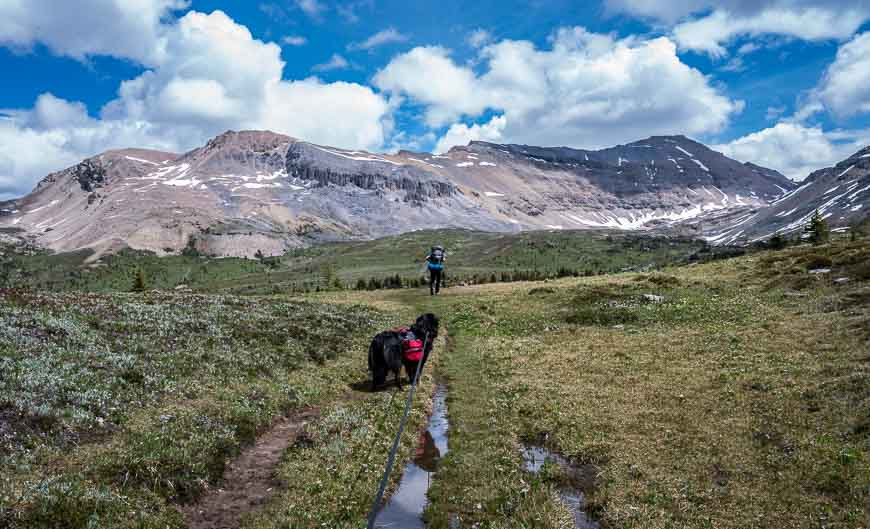

The hike from North Molar Pass to the Fish Lakes Campground
It’s only 3.3 km from the top of North Molar Pass to the Fish Lakes campground. It’s a quick descent – initially steep but then moderate, to reach wildflower-filled meadows.
The braided trail through this section can be quite muddy. I found gaiters to be worthwhile on this part of the Fish Lakes hike in Banff – because of the mud and the snow. (You can buy gaiters here.)
The hiking is glorious and the mountain views awe-inspiring on the descent. There is one stream crossing via a buckled log you need to make before the final approach to the Fish Lakes. Enjoy a superb view of the lake, about 10 minutes before reaching the campsite.




Backcountry camping at the Fish Lakes Campground
Ideally you need to book backcountry campsites in Banff National Park on the day reservations open. You can book online here or call: 1-877-737-3783 or 1-519-826-5391 (outside North America.) Reservations open on Monday, January 27, 2025 at 8:00 AM MT.
To increase your odds of getting a campsite, be flexible with your dates and aim to go on weekdays. I’d also recommend August over July as there will be fewer bugs.
Didn’t get the campsite reservation you were looking for? Don’t give up. Be the first to know when there is a campsite cancellation for your desired trip dates by visiting Schnerp.
The Fish Lakes campground is a popular backcountry one because of its location – and the fact there is some great exploring to be done in the area. It’s also an overnight stop on the way to the more remote Devon Lakes.
Don’t arrive expecting wooden tent pads. You’ll be lucky to find a spot on the ground that is level and isn’t muddy. Even after all the rain, it was still hard work to bang in the tent pegs.
The campsite does have poles for hanging your food. Don’t forget a waterproof bag and a carabiner to make the job easier. There is also a dodgy outhouse.
Numerous picnic tables can be found closer to the lake. It’s nice to have a flat surface to cook on but I sure don’t understand the table design. If you’re short, your legs probably won’t touch the ground.
We had Rosie the Bernese mountain dog with us and I am so glad we kept her on a leash (the rule in the park). A couple of porcupines wandered right by our tent and I can well imagine the outcome if she’d been off-leash. Porcupines are very destructive so be sure to keep your belongings in the tent. They crave salt so those hiking boots outside your tent might make a delicious snack.

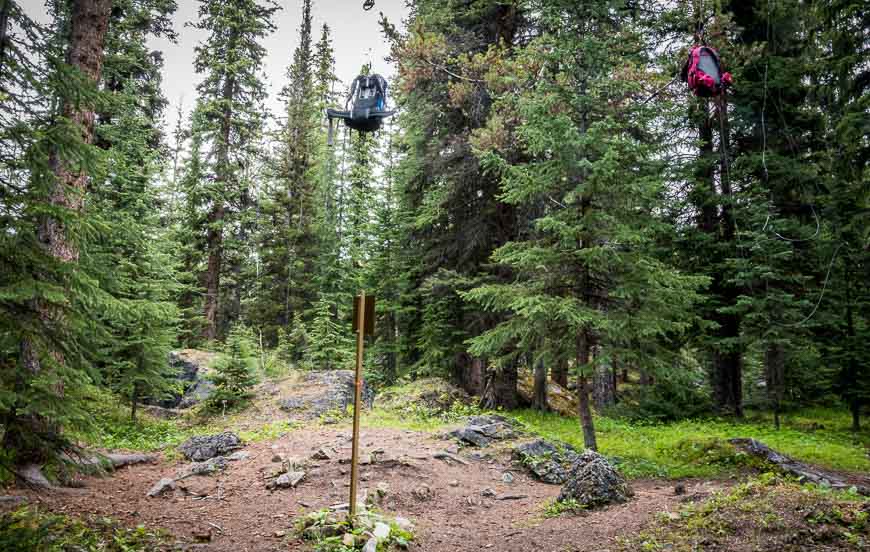

The hike to Pipestone Pass – a true wilderness pass in Banff National Park
We had planned to hike to Devon Lakes and spend the night. The lakes are accessed via Pipestone Pass and Clearwater Pass in a wild, lonely and very beautiful part of Banff National Park.
Unfortunately, about a kilometre shy of Pipestone Pass the skies erupted with thunder booming and lightning overhead. With inky dark skies over the area we were heading for, it looked like it was going to be nothing but storms for some time.
I’m not a fan of being high in the mountains in the storms. Years ago my ice axe buzzed and the hair on my arms started to stand up straight at the top of a 14,000 foot peak in Colorado. John and I ran off the mountain at full speed, rather than risk becoming a lightning death statistic. Partly because of that experience, I felt that turning back was the right thing to do.
We beat a retreat and will plan a return visit – probably in August one year when the mosquitoes are a little less plentiful.
Note that we saw fresh bear tracks on this lonely stretch of trail. Bear spray that is no more than three years old is essential out here – and you should know how to use it.
Read: Tips for Staying Safe in Bear Country




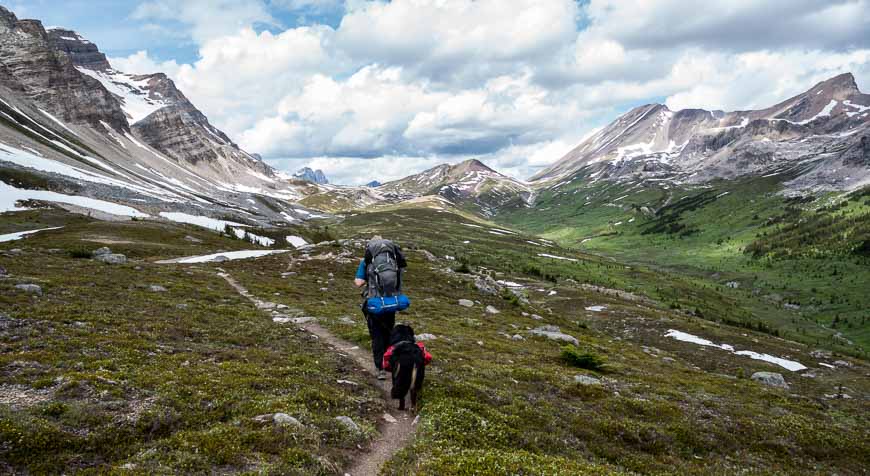
The hike back to the Mosquito Creek Trailhead
As much as I prefer a loop hike to an out and back hike, I have to say we enjoyed the hike back to the Mosquito Creek trailhead as much as the hike in. You still get similar mountain views but the lighting changes the look and the feel of the trail.
It took us 6.5 hours to hike back from the Fish Lake campground including a lunch stop. The total return trip from the highway to the campground is 29.6 km with 1,128 m of elevation gain.



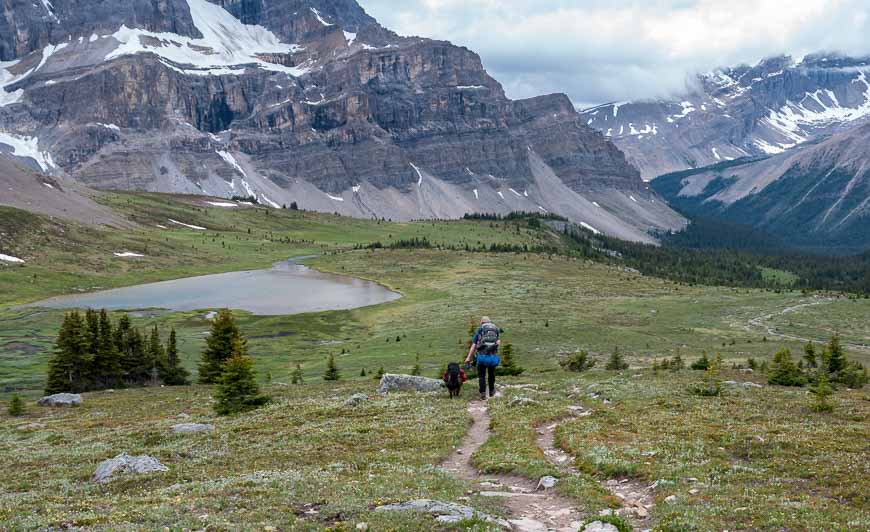
Trailhead location for the Fish Lakes hike in Banff
The trailhead for the hike to North Molar Pass and Fish Lakes is easy to find. Simply drive north for 24 km along the Icefields Parkway from the junction of Highway 1 and and Highway 93, just west of Lake Louise.
There are signs on the highway pointing to the Mosquito Creek Campground. Turn left (west) into a large parking lot. This is also where you’ll find the HI Mosquito Creek Hostel– a good place to spend the night beforehand.
The Mosquito Creek trailhead – with a map and a kiosk – is on the other side of the highway, immediately north of the Mosquito Creek Bridge.

Location map of the Fish Lakes hike in Banff
Interested in more backpacking trips in Banff and Jasper National Parks?
Here are some favourite overnight hiking trips along with a blog on 10 beginner backpacking trips in the Canadian Rockies.
- Tonquin Valley Hiking Guide – What You Need to Know
- Sunset Pass & Sunset Lookout Hike – Icefields Parkway
- Hiking the Skyline Trail in Jasper National Park
- A 3 Day Backpacking Trip that Includes Egypt Lake
- Hiking the Skoki Loop, Banff National Park
Click on the photo to bookmark to your Pinterest boards.

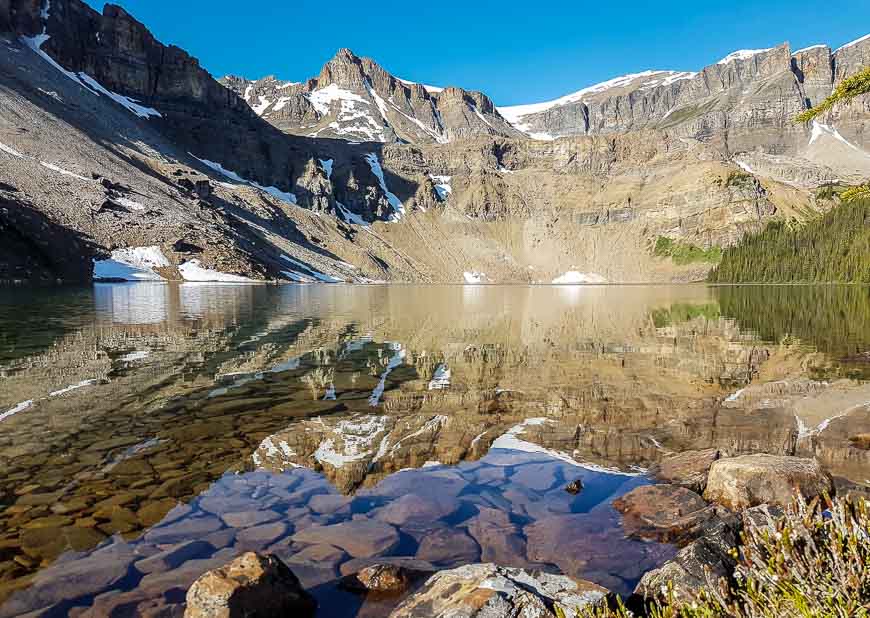
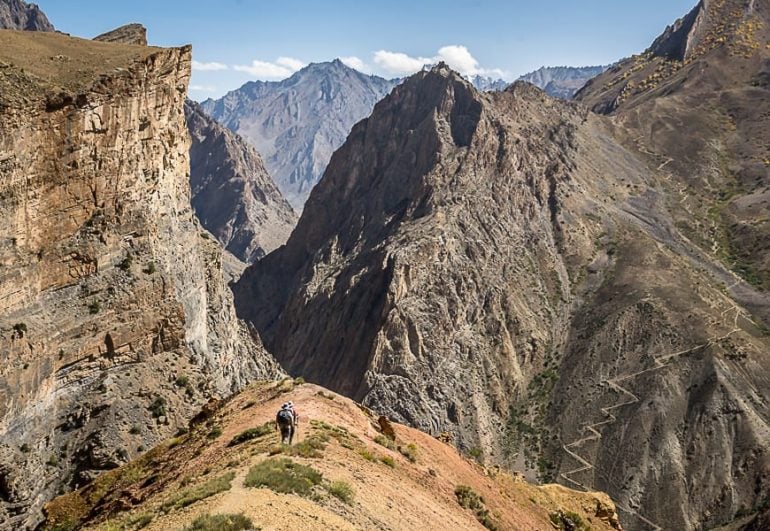
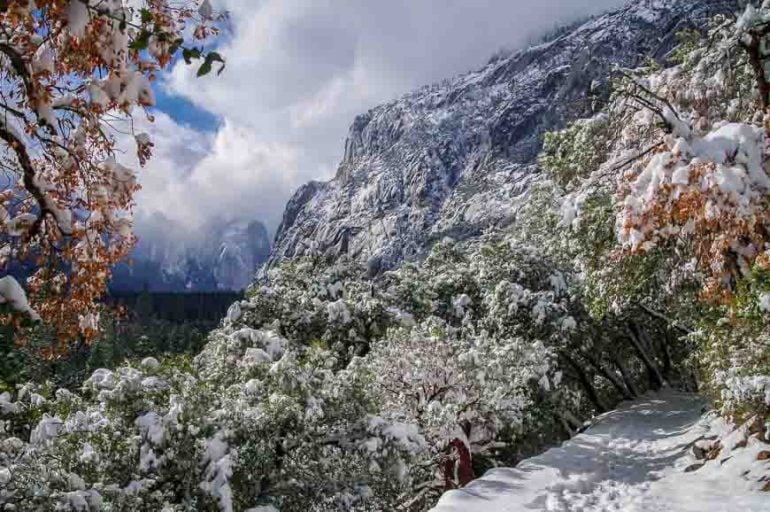
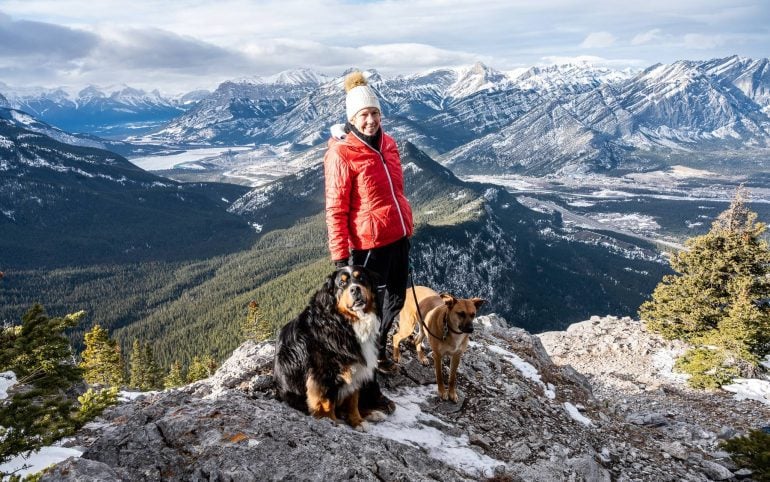
Planning this trip hopefully for August. Just wondering about the creek crossings with a dog. Our black lab loves water, but curious how big the creeks are and how fast?
Thanks!
@Julie We did it in early July. It was really just rock hopping. Nothing hard and super easy for the dog.
We hiked this trail in 2014 on the August long-weekend. The horseflies were so atrocious, that we actually only stayed at Fish Lakes CG only one night, rather than the two we had booked. I think it’s the only time in all our years of hiking that we bailed. Our poor Black Lab was covered in bit marks that she nursed for a few days following the hike. The views were stellar, and we had hot, sunny weather. I hope we can do this again sometime when the biting insects are not so relentless!
@Alan I have had bad flies at Baker Lake (Skoki area) but we were completely fine on the fly front in mid-July last year at Fish Lakes. Some mosquitoes but that’s all. Maybe go in late August when the bugs are mostly gone. It is a beautiful area and one worth returning to.
Hi Leigh,
Great photos and account of this trip. How early in the season were the photos taken? I’m always trying to get out earlier and earlier but I guess it’s dependent on the snow levels.
Thanks,
Lindsay
@Lindsay We went in mid-July and dealt with a reasonable amount of snow at the pass. Its so hard to call as it really depends on the snow year. You’re probably safe early in July – and even late June in a good year. Campsites can be booked in a couple of weeks.
Hi Leigh,
Really enjoyed your article, great pictures, and nice explanation of the trail. We were just on this trail, unfortunately didn’t have time to go that far, but chose it because it looked quiet. We came across it by default having driven into the parking lot of Peyto Lake, took one look at the traffic jam and said we’re outa here! Maybe the reason this trail is so quiet is because people shy away from it because of the name. Hope it remains a hidden gem.
Rena
@Rena or Maureen Isn’t it a treat when you don’t have to deal with the masses. WE really enjoyed our long weekend inthis part of the park.